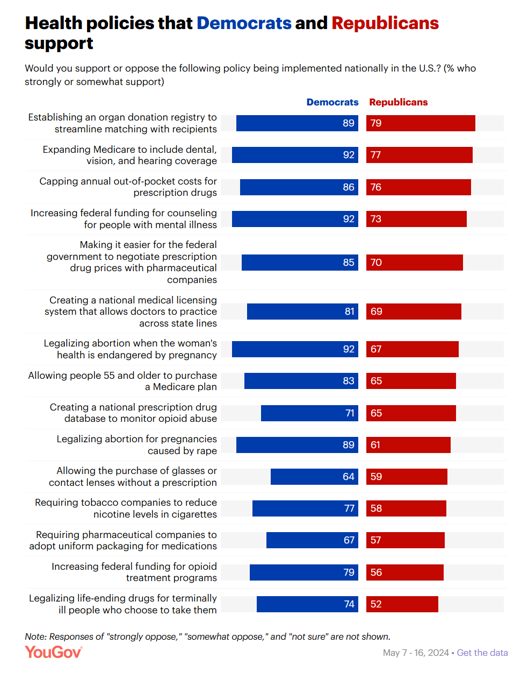In a super-divided electorate like the U.S. with about 60 days leading up to the 2024 Elections, we might assume there are no “purple” areas of agreement between the Red (Republicans) and the Blue (Democrats) thinking in PANTONE color politics.
Surprisingly, there are many health policies on which Democrats and Republicans concur, as found in a series of YouGov polls conducted in May 2024.

YouGov fielded the health policies poll in five waves online, each among roughly 1,100 U.S. adults in May 2004.
This bar chart summarizes health policy areas garnering at least 50% of partisans’ support (net = “strongly support” + “somewhat support).
While more Democrats than Republicans supported each of these issues, they all still received majority support across the aisle.
The top five issues were:
- Establishing an organ donation registry to streamline matching with recipients (89% of Dems, 79% of GOP)
- Expanding Medicare to cover dental, vision, and hearing coverage (92% Dems, 77% GOP)
- Capping annual out-of-pocket costs for prescription drugs (86% Dems, 76% GOP)
- Increasing federal funding for counseling for people with mental illness (92% Dems, 73% GOP), and,
- Making it easier for the federal government to negotiate prescription drug prices with pharmaceutical companies (85% Dems, 70% GOP).
Surprised?
Other issues with bipartisan support included creating a national medical licensing system allowing doctors to practice across state lines (growing in understanding and support in the COVID pandemic for telehealth expansion); allowing people 55 and over to buy into a Medicare plan; creating a national prescription drug database to monitor opioid abuse; allowing the purchase of glasses or contact lenses without a prescription; and requiring tobacco companies to reduce nicotine levels in cigarettes.
Under the category of women’s health in the post-Dobbs era, a few other data points that stand out were:
- Legalizing abortion when the woman’s health is endangered by pregnancy, 92% Dems and 67% GOP, and,
- Legalizing abortion for pregnancies caused by rape, 89% Dems, 61% GOP.
In terms of end-of-life care, there’s also majority support/consensus regarding legalizing life-ending drugs for terminally ill people who choose to take them, among 74% of Dems and 52% of GOP voters. 
Health Populi’s Hot Points: As I draft this post on September 4, 2024, I am listening to the Superintendent of Barrow County Schools discuss today’s deadly shooting incident at the Apalachee High School in Winder, Georgia, about one hour from Atlanta. The Superintendent is explaining how he hopes to secure the school campuses and unify the community following the latest gun shooting incident committed earlier today by a 14-year-old student from that school. At this point, four people have died: two students and two teachers.
YouGov assessed many policy proposals to ascertain bipartisan support, and gun policies was one of the areas polled in the May 2024 surveys. The bar chart shows the three areas garnering majority support across the Dems and GOP — for raising the minimum age to buy semiautomatic firearms from 18 to 21; requiring gun buyers to wait five days before receiving the gun; and, allowing guns to be temporarily seized form people whom judges deem dangerous.

The health care industry — namely hospitals and systems, physicians and nurses — have called out gun violence — and particularly the public health epidemic that gunshots are the #1 killer of American children, which you can learn more about at this link to the 2023 CDC report on, “unintentional firearm injury deaths among children and adolescents.” The data from the CDC reported was graphed in a CNN news report, shown here, where firearms overtook the top cause of death for people ages 1 to 18 from motor vehicle accidents in 2021 (reported out in CDC’s 2023 analysis).
I’ll leave you with one outstanding exemplar-leader in the public health community walking the talk about solutions to this crisis: it’s Michael Dowling, head of Northwell Health, who believes gun safety is in his “lane” of health, health care, and community health. Read more about Northwell Health’s approach to gun safety and health/care here. He led the creation of the Northwell Health’s Center for Gun Violence Prevention in 2020. He and his team will inspire you in a call-to-action on this in your own community.




 Thanks to Feedspot for naming this blog, Health Populi, as a
Thanks to Feedspot for naming this blog, Health Populi, as a